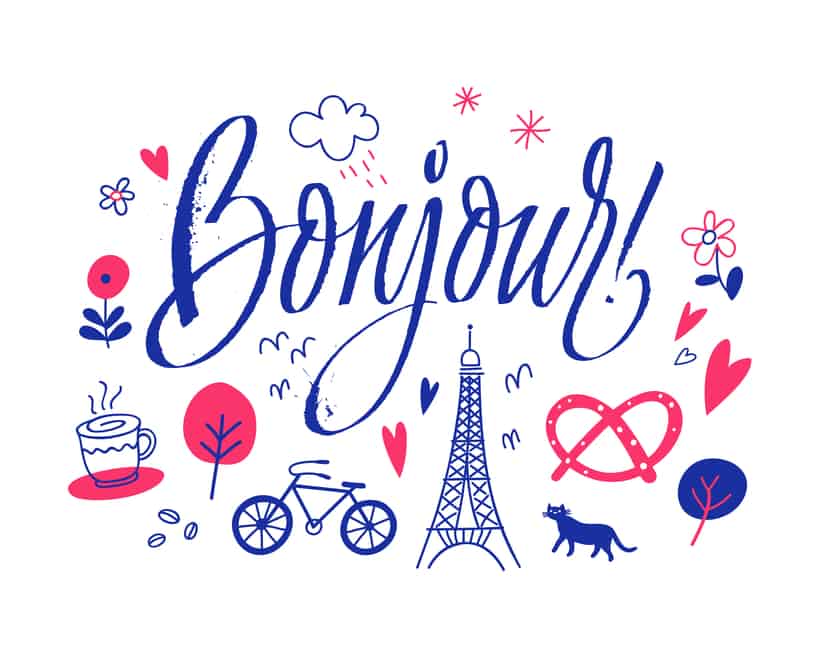Curious about the meaning of bonjour? You don’t have to spend more than a couple of days in France to notice that bonjour is said all the time and for good reason. A simple hello is the magic word that starts every interaction off on the right foot.
The absence of a bonjour in certain situations will let people know you’re out of touch with cultural norms in France at the very least and that you need to brush up on your French manners. Let’s get into what the bonjour meaning in French is, when to use bonjour, and why it’s so incredibly important.
What does bonjour mean in French?

Photo credit: Shutterstock.com/Shirstok
Bonjour tout le monde! What does bonjour mean in French? Before we get into the specific instances of when to say bonjour in France, let’s define it. Simply put, bonjour in French means hello and literally translates to good day.
Let me recap what I wrote in a post earlier this year about my favorite French social norm:
“These days, when back in the USA observing non-French people, it is almost jarring for me to see how some Americans address each other. We don’t always say hello before ordering at a restaurant or asking a store employee a question. We most certainly don’t always say thank you and goodbye.
And how many times have you seen customers wish employees a good day? Yeah, it happens but it’s not as common in the USA as it is in France. Now, it’s my home culture that surprises me.
It goes without saying that of course not everyone in the USA is rude, short, or forgets polite greetings — I’m not saying that at all. Many Americans were raised to be super polite and always address others politely. But the difference is that in the USA, it’s not a social norm across the board to say hello, thank you, and goodbye. Every time. You can get away with less.
While it’s not the most polite thing, in the USA it’s more accepted to be less polite in social interactions and just say to a waiter, “I’ll have the steak.” Or “I’ll have the steak. Thanks” instead of “Hello, I’ll have the steak please. Thank you,” like you’d hear in France.”
That’s the major difference between the bonjour meaning in French versus how we use hello in English. In France, saying bonjour in French is a sign of respect and a cultural norm. It’s not optional to forgo the greeting if you want people to know that you understand French manners. So what does bonjour mean in French? A lot more than just hello! Use it and use it often!
You’ll come across as impolite if you don’t say bonjour and that’s not the first impression you’ll want to make. It’s even seen as insulting to not say bonjour in French and then French get the reputation for being rude or snobby… but that’s a conversation for another day.

Photo credit: Shutterstock.com/Gorodenkoff
When to say bonjour in French
Now let’s get into the specific situations where you need to say bonjour in French (regardless of the region of France). If you are in France, make sure to speak up and say bonjour in French before any of the following:
Note: If it’s in the evening, you’ll want to say bonsoir instead (good evening)
Say bonjour in all of the situations you’d say hello to someone in the USA PLUS:
-Entering a doctor’s waiting room with other patients
-Seeing co-workers first thing in the morning at work
-Boarding a bus, say bonjour to the driver as you pass by
-Before asking someone a question (random person on the street, shop employee, customer service phone line, etc.). This includes asking someone if they speak English. Be sure to say “Bonjour, parlez-vous anglais ?” and NOT “Parlez-vous anglais ?” It makes a difference.
-Greeting a shopkeeper upon entering a small store
-When a waiter comes to your table to take your order
-Any time you interact with an employee of a store, so a cashier, a bakery employee, etc.
-Upon entering an elevator with other people
Many of the situations above might seem like common sense depending on where and how you were raised, but in France none of these is optional if you want to be perceived as someone who is socially educated with good French manners.
Nothing will go your way in a service interaction if you leave out the obligatory bonjour.
To that point, I’ve seen shopkeepers and cashiers lightly scold tourists who launch right into their question without a bonjour in French. The French person won’t respond to the question and instead says bonjour deliberately, sometimes multiple times, until their bonjour is reciprocated. Only then can the conversation move forward. Within two or three repetitions of the cashier saying bonjour, the foreign tourist gets the point and I’m sure that’s the last time they’ll make the same mistake.
Top 3 mistakes tourists make in France >>

Photo credit: Shutterstock.com/Lizardflms
When to NOT say bonjour in France
Do not say bonjour to random people you pass in the aisles of a grocery store or on the street (unless you know them, that is). In some small towns, people do say bonjour to other adults they pass in a park but that’s at your discretion and can be regional.
If you’re constantly saying bonjour to every single human being you see in a day and shouting it across a park to people you don’t know, that would be seen as bizarre, so don’t go overboard. When in doubt, do say bonjour to be on the safe side.
Another thing to keep in mind is that bonjour in French is not a come-on or pickup line. It’s also not an invitation to deep dive into small talk. Saying bonjour is a social reflex and people do it because it’s required, not because they want to date you or have a conversation with you about the weather or what’s going on in the world.
Of course there are exceptions, but generally speaking, when you say bonjour to a stranger, it’s simply that, a necessary and polite greeting that says, “Hello, I see you, fellow human being, and I’m acknowledging your presence first and foremost.”
Even though I know to expect it at this point, it can still catch me off guard when I hear a child say bonjour in the park when walking Dagny. They are usually between 5 and 10 years old and about half the time, I can expect a bonjour from a child who passes us by. The bonjour meaning is exactly what it sounds like, just a polite child saying hello.
In the USA, I don’t feel like kids say hello to adult strangers quite as often. Kids are taught about “stranger danger” and seem more shy, in my experience.

Photo credit: Shutterstock.com/RossHelen
Why foreigners don’t say bonjour in French
There are three main reasons I’ve come across where foreigners forget their French manners and don’t say bonjour in French. The first is because it’s a cultural difference. As I mentioned, while it’s not the most polite thing, we can get away with skipping over the bonjour in the USA especially in a busy store and we want to get right to the point, when we’re stressed and manners go out the window, or just because it’s not our personal default to say hello.
I’ve heard people approach customer service desks in the USA and launch into, “Yeah, this toy isn’t working right, so I’d like a refund” and no one bats an eye.
In France, it would need to be, “Bonjour, this toy isn’t working right, so I’d like a refund please.” If you aren’t aware of cultural norms in France (or are impacted by what I mention next), our default setting is what we know from our home country. Understanding the bonjour meaning in French from a cultural standpoint goes a long way.
The second reason why a foreigner may not say bonjour is because of distractions. Everything can be new and overwhelming in a busy French bakery or store. It’s a bit of a sensory overload at times, so when it’s your turn to order or pay, the very first rule of French conversation might go out the window. It’s not intentional and you don’t mean to be rude, but you’re fumbling with your coins or are so enamored by the selection of pastries behind the glass that in the moment, bonjour slips your mind. It happens.
The last reason is one I’ve fallen victim to and has to do with nerves around speaking French — especially when we’re a beginner. Sometimes we are so focused on getting the French words correct that come after bonjour that we inadvertently skip over the easiest word of all. We rehearse the big phrase we want to say in our head and are so anxious to just blurt it out that bonjour doesn’t always factor into the picture.
If you feel confident with bonjour and understand the cultural significance of bonjour meaning that it’s second nature at this point, then feel free to use merci and s’il vous plait liberally as well. These are polite French words to know that’ll make a good first impression.
Lastly, what’s the right reply to bonjour? You guessed it, it’s bonjour. If someone says hello to you, you can greet them with the same thing.
***
As a foreigner, if you’ve ever forgotten to say bonjour in French, don’t sweat it. It’s not the biggest deal in the world if you’re a tourist but is something to be aware of for next time. If you live in France, you’ve already learned the answer to, “What does bonjour mean in French?” and I don’t think we get much of a pass beyond one or two slip-ups.
Now that you know when to say the magic word, use it. If you have made a mistake with bonjour in Paris or elsewhere in France, no worries. You’ll get it right la prochaine fois.
Tell me below in the comments, have you ever forgotten to say bonjour in France? What’s your experience with the magic French bonjour and French manners? What does bonjour in French mean to you?
Also, check out my eGuide with even more France travel tips so you’re prepared on your next trip!
Pin my what does bonjour mean in French post:







Very helpful..!
Merci.
When we were check out at a hotel at the airport in Marseilles one early morning I forgot to say Bonjour. As I approached the desk I recognized the gentleman from the day evening before and I knew he spoke English. That was my first mistake. I was in a hurry (no excuse by the way, but I was), so I started my conversation with “I would like to check out,” forgetting to say Bonjour first. His response was a very crisp “Bonjour Madame.” I immediately felt SO embarrassed. I knew better and being in a hurry was no excuse. So I took a deep breath and started over again with. “Bonjour Monsieur, je suis desole” and things proceeded well from there. I learned two things – slow down and always be polite and never forget to say Bonjour and also memorize the phrase “je suis desole” just in case you need it.
Hi Sam, thank you for sharing your experience. It’s one that’s really common and I’ve done it as well. It’s so easy to forget the bonjour but I appreciate the reminder and then it becomes second nature. Thanks again for reading and have a wonderful weekend!
A very interesting post , thank you so much
Thanks for reading!
I moved to France from the US 5 years ago and quickly learned there were some differences in greeting norms, particularly when passing people on the street. In the California beach town I came from the majority of people that pass on the street acknowledge each other. It could be a smile, quick head nod, “hello”, “morning” or just a smile. In contrast, in France most people do not even make eye contact when passing. II have actually startled people by saying “bonjour” on the street. I was told jokingly by a French friend that the French look down instead of making eye contact to avoid stepping in the dog mess that most French cities have problems with, but that is a completely different issue.
This is something I’m definitely guilty of forgetting, especially when asking for help in a store! I usually just say, “Excuse me, where can I find…” and they always reply with a pointed “Bonjour, ” and then I remember to say it. I don’t have a problem remembering otherwise, but I guess it’s just my American tendencies haha.
I love how you mention that this doesn’t mean you should be saying bonjour to literally everyone and shouting it across the park. I do remember being somewhat surprised when people in my Dijon neighborhood often said bonjour in passing. I don’t know why it was surprising though, as in my hometown in Ohio, it’s quite common to say hello to people in parks and in your neighborhood. I remember once trying to say hello to people I passed in a Boston park (after coming from a couple weeks in Ohio), and basically everyone ignored me haha.
Really interesting post, Diane!
I really enjoyed your article and could really relate to it because it happened to me in Paris. I was born in France but I have been living in the US for a very long time. Couple of years ago , I was in Paris and I went into a “Zara” and asked a question without saying “Bonjour” first and the person gave me a real dirty look and said “Bonjour” in a really nasty voice. I realized that I had been away too long. I had to remind myself not to forget to say “Bonjour” first before adressing a french person if I wanted to avoid the dirty look . LOL I love France and cant wait to go back but I wont forget to say “Bonjour Madame ou Bonjour Monsieur”
Surely by making ‘Bonjour’ a mechanical and obligatory way to start any conversation, it loses any meaning it would otherwise have if used when the speaker genuinely wishes someone a good day?
Hi Thomas,
U are partially right, it’s not really the meaning of the words who matters (except with people u often meet like ur baker, friends and family, etc where it really keeps the meaning of “wish u a good day”).
It’s more a social convention with strangers, especially with people who work in the service of others (like waiters, hotel staffs, shopkeepers,…), i think it’s a way of showing respect to another equal human being and not just a machine that is here to serve u.
Or at least (as a french man) that’s i choose to think 🙂
But don’t worry, not all the french always says “bonjour”. For example if u approach me in the streets by saying “excuse me can u help me with directions” It works perfectly fine for me and for most people i think.
Just don’t be too abrupt and there will be no issues at all 😉
Ps: Sorry for my broken english, i tried my best^^’
Hi Thomas,
You’re partly right, it’s not really the meaning of the words that counts (except with the people you often meet like your baker, your friends and your family, etc. where it really keeps the meaning of “good day” ).
It’s more of a social convention with strangers, especially with people who work in the service of others (like waiters, hotel staff, shopkeepers,…), I think it’s a way of show respect to another equal human being and not just a machine that is there to serve you.
Or at least (as a Frenchman) that’s what I choose to think 🙂
But don’t worry, not all French people always say “hello”. For example, if you approach me on the street and say “Excuse me, can you help me with directions”, that works perfectly well for me and for most people I think.
Don’t be too abrupt and there won’t be any problems at all 😉
Ps: Sorry for my broken English, I tried my best ^^’
Yes, I’ve noticed this a lot in my 15 years of living in France, and even if I say ‘excuse me’ to get the attention of a supermarket assistant, I am responded to with a sarcastic ‘bonjour!’, which I find frustrating because I am being polite (normal practice in the UK) and it’s logical since I’ve not yet made eye contact with the person stocking shelves or whatever). Strangely enough, when I recount this to French friends, they are surprised by these experiences, saying that I must be imagining it, but maybe that’s just French pride, lol.